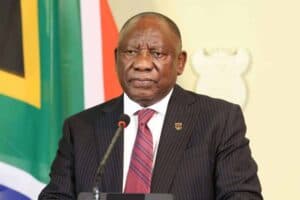The electricity crisis developed over years and a state of disaster won’t fix it.

Government does not know whether it is coming or going with the Eskom crisis and declaring a state of disaster won’t solve that.
That is the response from Agri SA CEO Christo van der Rheede to the ANC’s proposal to declare a national state of disaster to deal with the electricity supply situation that has left South Africans without power for hours every day
Van der Rheede participated in a panel discussion hosted by the National Press Club in Pretoria on Tuesday (7 February) as South Africa, according to Bloomberg, experienced its 100th consecutive day of rolling blackouts.
ALSO READ: The inconvenient truth about Eskom’s Kusile power station
Eskom announced on the same day that Stage 3 (daytime) and Stage 4 (overnight from 16:00) load shedding will continue until further notice.
Root cause is the real disaster
Van der Rheede said Agri SA attended the National Disaster Management Advisory Forum on 1 February, following which it consulted its members about the proposed state of disaster. Agri SA members decided not to support it.
He said the three key players – the Department of Mineral Resources and Energy, Eskom, and the Presidency – don’t know exactly what the problem is and contradict each other.
How would a state of disaster solve the lack of coordination and political will, he asked.
How would it sort out corruption and lack of intelligence at Eskom when police look on and do nothing while thieves dig up cables?
Van der Rheede said it is wrong that the president leads the National Energy Crisis Committee (Necom). “Eskom must be at the top.” The utility must be empowered to do its job.
ALSO READ: Load shedding to alternate between stages 3 and 4 this week
Agri SA wrote a letter to Dr Elias Sithole, head of the National Disaster Management Centre, to make its position clear – and asked that if the decision is taken to proceed and declare a state of disaster, agriculture be declared an essential service to ensure food security.
Consequences – unintended or otherwise
Advocate Stefanie Fick, head of the accountability division at the Organisation Undoing Tax Abuse (Outa), said the country is already in a state of disaster on many fronts.
The question is whether it should be declared a disaster legally.
Fick pointed out that the electricity crisis is the result of systemic problems that have existed since 2008 and asked how the declaration of a state of disaster will solve it now.
It would instead open the doors to corruption – as during the Covid-19 state of disaster, when personal protective equipment was sold at hugely inflated prices to government to enrich a few people.
Fick said that, if necessary, Outa will approach the court if a state of disaster is declared, although it will target its attack where it will have the biggest effect.
ALSO READ: Santam and Hollard pull cover for grid failure
Not the right tool
Professor Dewald van Niekerk of North-West University (NWU) and head of the African Centre for Disaster Management cautioned against using disaster management law to manage everyday problems.
He said when a state of disaster is declared, the classification must be ratified by the head of the national disaster centre. This should follow a scientific assessment, but in the current circumstances there will be huge political pressure to proceed even in the absence of such scientific evidence.
Van Niekerk said it would be easier to manage the electricity crisis in a state of disaster as normal control measures and red tape can be done away with – but it is not the right legal instrument.
“We cannot manage ourselves through disasters,” he said, adding that the ANC government is actually saying everything it has done so far doesn’t work.
A state of disaster gives almost unlimited power to the president, Van Niekerk said. “The president finds himself in a position where he cannot govern. That is why he needs extraordinary measures.”
ALSO READ: 28 SA companies to implement 4-day work week on 1 March
Legislatively difficult
Professor Kedibone Phago, head of the NWU School of Government Studies, said it would be like using a square peg in a round hole. In the context of the legislation, it would be difficult to classify the current crisis as a disaster, he said.
He said South Africa needs professionals who head institutions to discharge their responsibilities with minimal political interference.
Putting Eskom into business rescue is also not an option, because the problem is political, he said.
State institutions and municipalities are “beyond crisis proportions”.
The electricity crisis developed over years and a state of disaster won’t fix it. What is needed is to rebuild state institutions, he said.
Politicians ‘out of touch’
Phago asked where President Cyril Ramaphosa is. He has been in a leadership position for years. He must be held accountable. So far South Africans have not done that robustly, he said.
“We are suffering from a leadership problem across all sectors, and we must acknowledge that,” he added.
“Many leaders are talking from behind high walls and gated communities” and are out of touch with the reality of ordinary South Africans.
Phago said a state of disaster will not have the desired outcome.
On the contrary, it will only give power to politicians that they will use for the wrong reasons.
The electricity crisis developed over years and a state of disaster won’t fix it. What is needed is to rebuild state institutions.
He said special disaster measures were abused globally the world during the Covid-19 pandemic.
“It was just a feast for politicians all over the world.”
This article originally appeared on Moneyweb and was republished with permission.
Read the original article here.






